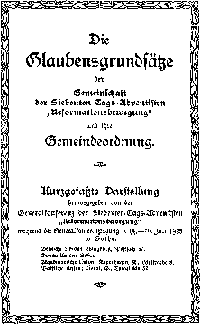1928 – Second General Conference Session
The second General Conference session was held at Isernhagen, Germany, June 24–30, 1928. Twenty-one delegates were present.
In the best interest of the development of the work, the Danube Union was divided into two. Unions and Fields represented at this session:
German Union (including France, Switzerland, Holland, Czechoslovakia, Poland: over 1400 souls)
Baltic Union (Estonia, Letland, Finland: over 500 souls)
Scandinavian Union (Denmark, Sweden, Norway)
East Danube Union (Romania: over 1250 souls)
West Danube Union (Bulgaria, Hungary, and Yugoslavia)
British Mission Field
North American Mission Field
The secretary’s report showed a slight increase in the membership of the Reform Movement (4,208 souls). The number of ordained ministers, Bible workers, publishing house employees, and other helpers totaled 103.

Encouraging letters from Russia, South America (Argentina and Brazil), and Africa (Northern and Southern Rhodesia) told of considerable progress. The message of reformation was gaining new ground. In Russia, where Brother H. Unrau was working, over 500 souls had taken their stand with the Reform Movement. The report of the session, published in the Adventarbeiter (Advent Worker) of October 1928 (year 1, number 1), says: “Different countries, such as Palestine, African countries, India, are asking for workers.” And the report continues: “The Lord will, in due time, do His work, and He will make souls willing to help promote His work.”
In view of the urgent Macedonian calls from many places, the need to prepare and send out missionaries was given serious consideration. One of the resolutions adopted in 1928 says that young men should be encouraged to study foreign languages, with the assistance of the General Conference, so they can be sent abroad. But it was felt that it would not be enough to put young men through a training course and then send them out. They would have to gain some experience in the home field before they could be entrusted with responsibilities abroad. History is full of lessons for us. We have learned that, if we send inexperienced young men into a new field by themselves, we will have cause to regret our mistake.
The brethren assembled in 1928 were concerned about the uplifting of the principles. This is evident from the decision that the people should be instructed concerning the need to take a higher stand in health reform, dress reform, and Sabbathkeeping, and that, in harmony with the written Word, only qualified brethren (with emphasis on 1 Timothy 3:4, 5) should be employed as workers and elders.

With reference to proper Sabbathkeeping, our pioneers understood that the brethren in general needed more instructions. Therefore, according to the Bible and the Spirit of Prophecy, we as a church have maintained that cooking on the Sabbath, unjustified traveling on the Sabbath, leaving work late and arriving home after sundown on Friday evening, and attendance at public school on the Sabbath are forms of transgression of the fourth commandment. It was agreed that our people should be instructed that these and any other transgressions prepare the soul, not for the seal of God, but for the mark of the beast.
For the new term Brother O. Welp was elected president and Brother W. Maas secretary.
1931 – Third General Conference Session
Nineteen delegates assembled at Isernhagen, Germany, August 4–10, 1931.
Der Adventarbeiter (The Advent Worker), which was the official organ of the General Conference, published a comprehensive report (October 1931) with some statistics that were presented at this session, as follows:
“If we consider the wonderful blessings bestowed upon us during the past, our trust in the help of God is stronger than ever. . . . During the past three years more than 800 new souls were accepted into the church. At present our membership is over 5,000. . . . About 100 workers are actively engaged in carrying this message, and several hundred more colporteurs are carrying the present truth through our literature from house to house.”

Decisions of general interest adopted at the third session: to teach people how to reach, by the grace of God, a higher moral stand; to start a missionary school for the training of qualified young men for the work of the Lord; to establish health centers in various places.
It was also decided that, in future, the General Conference sessions should be held every three years.
In those days many Adventist leaders were teaching that the latter rain had already fallen. Our General Conference delegation, 1931, was therefore required to define our position on this question. From Der Adventarbeiter (The Advent Worker) of October 1931 we quote:
“It is quite generally known that Seventh-day Adventists throughout their ranks are teaching that the latter rain has already fallen. This teaching is a great deception, and it is contrary to the Bible and the Spirit of Prophecy. Also, there are some who have left this Movement and are now trying to deceive souls and becloud minds by telling them that we teach that the latter rain has already fallen. For this reason we make it plain that we do not believe that the latter rain has fallen. All those who use these arguments or insinuations against the Reform Movement are making untrue statements for which there is no ground whatsoever. And there are others who, through a wrong interpretation of Revelation 18, are trying to put this Movement in a false light. We know for sure that whatever these people may do will not hinder our work. These points were thoroughly discussed by the delegation, not because of the influence of those who left this Movement, but because of the well-known belief of many leaders in the Adventist Church who openly profess that the latter rain has fallen. We praise God that our understanding of these points (the latter rain and Revelation 18) is clear. As far as these subjects are concerned, we stand firmly on the teachings of the Bible and the Testimonies. It is our prayer that God may help His church to gain the victory over every besetment and over every wrong word and action, that the blessed promise of the latter rain may soon become a blessed reality.”
The subject of organization was also given consideration by the delegates in 1931, not because there was any doubt in their minds, but because in some places our people had to face those who insisted that there was no need for church organization. On this point the report of 1931 reads as follows:
“There are continually, as the Spirit of Prophecy declares there would be, some who seek to do away with organization, who try to disorganize the work at a time when organization is most necessary. Praise be to God that on the question of thorough organization there is full unity among us.”
A special financial plan was adopted: So that there might be means to extend the work into new fields and to help poor missions that had already been opened, the Union Conferences should build up a special fund through colporteur work. Special “missionary days” were to be designated for this purpose in the autumn of each year.
Officers elected for the new term: O. Welp, president; W. Maas, secretary.

